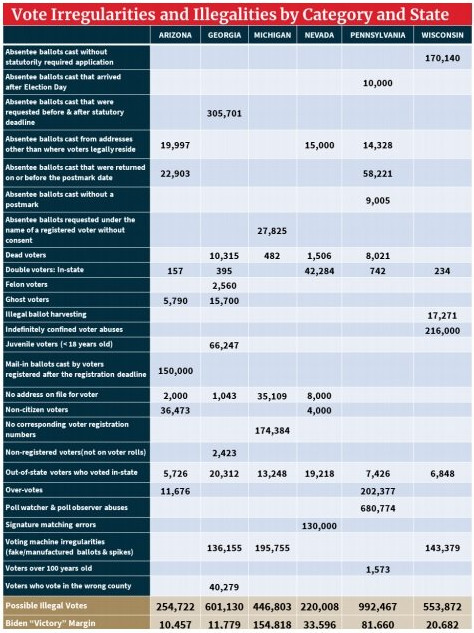How can tax collectors and prostitutes be closer to the kingdom of God than religious leaders? We discuss this question in today’s study of Matthew 21:31.

Before that, however, we look briefly at a current event and a letter from a reader.
Election Fraud Cases Before the Supreme Court
Joe Biden is in the Whitehouse, but tomorrow, February 19, 2021, the Supreme Court of the United States is scheduled to consider five pending election fraud cases. This doesn’t mean they are going to hear the cases. It means they are going to decide tomorrow whether or not to hear the cases.
My hunch is that they will decline to hear the cases based on some technicality as they have done before, such as a lack of standing or the fact that the election is already over.
However, this would be a mistake. Even though the results of the election probably cannot be overturned at this point, the 2020 election was not the last election this country will ever have. There were significant and widespread problems with the 2020 election, and we can only exist as a country if there we have safe and secure elections. So regardless of what whether or not the 2020 election can be overturned, the Supreme Court has the obligation to make sure that future elections follow the constitution.
I hope they take up all the cases. But we’ll see…
Here, by the way, is a chart showing just some of the potentially fraudulent votes that were cast in the 2020 Presidential Election:

Whether you voted for Trump or Biden, I think we can all agree that fraudulent votes should not be allowed in any election, ever.
Question: Have I believed if I Agree to the Facts of the Gospel?
Hi. I am 33 years old. I grew up in a Christian home. My dad was a pastor. I am not a Christian. I have had a handful of false conversions in my life. Ever since the coronavirus I have been on this journey of trying to figure out how to get saved. It is all I think about. I have not been eating as much as I should be and have lost a lot of weight. I am barely making it through each day right now. I believe there is a really good chance things are setting up for the end times. I am so scared of going to hell!! I have had so much confusion about repentance and faith.
Since the beginning of this journey I have been praying to God to help me understand repentance and faith. I believe He is helping me understand repentance!! My dad found a book called, (#AmazonAdLink) Turn and Live: The Power of Repentance by Robert N. Wilkin. I now understand that repenting of sins has nothing to do with how we get saved!!
I am still confused about faith though. My dad has told me that it is not just believing the facts. That is part of it but it is hearing the gospel, being fully persuaded the facts of the gospel are true, and making a decision to put your trust in Jesus Christ as your payment for your sins. That is the decision I want to make.
I have extreme OCD. It effects every area of my life. I am not even able to work because of it. I am not sure how to make the decision to put my trust in Jesus Christ as the payment for my sins. I am so scared of thinking I am making the decision and really just be agreeing the facts are true. I am not sure what to do or how to work through this. Also, if you could be praying for me I would really appreciate it!!
I will definitely be praying for you. I have never been fond of the “make a decision for Christ” terminology, mostly for the very reasons you are having problems with it. How can any one know if they have made the decision? It is confusing.
I hate to disagree with your dad on this, but in my book on faith ((#AmazonAdLink) What is Faith?) I argue that faith is simply agreeing to the facts. It truly is mental assent. So if you agree that there is no way to receive eternal life than through Jesus, this is the same thing as believing in Jesus. You have agreed (or believed) that Jesus gives you eternal life because there is no other way to receive it.
Anyway, don’t get in an argument about this with your dad. I understand where he is coming from, in that he doesn’t want Christians to just have mental assent, but we should also live our lives for Jesus. I agree with this desire, but the way to accomplish this is not to say that people who have mental assent haven’t actually believed. Instead, the best way to proceed is to say that people who have mental assent have indeed believed, and that discipleship is accomplished separately through following Jesus.
By the way, based on what you have written to me … I think you are a Christian. I’m not sure why you think you have had false conversions, but don’t allow moral failure to make you think you are not actually a Christian. Eternal life is not based on our own good works, but is based entirely on the promises of Jesus. And He promises that if you have believed in Him, then you have eternal life.
Why Tax Collectors and Prostitutes Enter the Kingdom of God Before Religious Leaders (Matthew 21:31)
In my Gospel Dictionary Online course, I have a lesson on the Kingdom of God. In this lesson, one of the passages I discuss is Matthew 21:31. Here is what this verse says:
… Jesus said to them, “Assuredly, I say to you that tax collectors and harlots enter the kingdom of God before you.”
In some ways, it is better to be a thief or a prostitute than it is to be a spiritual leader or Bible teacher. At least, that is what Jesus says in Matthew 21:31. In the context, Jesus is speaking to the chief priests and elders in Jerusalem (Matthew 21:23), and after they question Him about His authority, He tells them the Parable of the Two Sons (Matthew 21:28-30). In this story, a father asks his two sons to work in his vineyard. The first son says he will not obey, but then he does. The second son says he will obey, but he doesn’t. Jesus asks the religious leaders which of the two sons actually did what the father asked, to which they correct answered “the first son.”
As stated in the discussion of Matthew 13:24-30, when it comes to following Jesus and living as a disciple within the kingdom of God, what a person actually does is more important than what they say. Jesus then draws a conclusion from this point that when it comes to living within the kingdom of God, the tax collectors and prostitutes are better off than the priests and religious leaders of the community.
Several elements of this passage help draw out the significance of Jesus’ words. We must consider the initial question from the religious leaders, the nature of the kingdom of God, and why tax collectors and harlots are entering the kingdom ahead of the spiritual leaders.

What was wrong with the Spiritual Leaders?
First, let us go back and briefly address the question from the spiritual leaders that led Jesus to tell this parable.
Back in Matthew 21:23, the religious teachers ask Jesus where His authority comes from for His teachings and His actions. They say, “By what authority are You doing these things? Who gave you this authority?” In the days of Jesus, Rabbis, priests, and elders based their authority on which Rabbis they had studied under, or which Rabbinical school they belonged to.
If a particular teacher had not learned from any reputable or famous Rabbis, or if they were not in good standing with either of the top two Rabbinical schools of thought, then it was assumed that such a teacher had nothing good to say and should not be listened to.
This is very much like Christianity today. It is not uncommon at Pastor Conferences for pastors to ask each other similar questions: “What school did you attend? How many advanced degrees do you have? How many followers do you have on social media? How big is your church? How many books have you sold?”
In other words, “By what authority are you teaching these things?” If you refuse to listen to certain teachers because they do not have a Ph.D. from your favorite seminary, or because they are not on staff with a mega-church, or have not sold a millions books, then you have fallen into the same trap that Jesus is speaking about here. Be careful about that mindset, for it can cause you to miss out on entering into or experiencing the kingdom of God.
The Nature of the Kingdom of God
This brings up the second issue, namely, the nature of the kingdom of God. Once again, if someone confuses “entering the kingdom” with “receiving eternal life” or “going to heaven,” then this text will create all sorts of problems. When misread this way, Jesus seems to be saying that tax-collectors and prostitutes have a better chance of receiving eternal life than spiritual leaders do. If that’s the case, then everyone should become a tax cheat and a prostitute! But of course, that is not what Jesus is saying.
 The kingdom of God is the rule and reign of God in our lives on this earth. When we enter into the kingdom of God, we enter into an experience of the life God wants for us here and now, during our lives, on this earth. Yes, our experience of the kingdom of God will continue on through eternity, but it can begin now, and it is based almost entirely on how we follow the teachings and example of Jesus in our daily lives. So entering the kingdom of heaven is not the same thing as going to heaven when we die.
The kingdom of God is the rule and reign of God in our lives on this earth. When we enter into the kingdom of God, we enter into an experience of the life God wants for us here and now, during our lives, on this earth. Yes, our experience of the kingdom of God will continue on through eternity, but it can begin now, and it is based almost entirely on how we follow the teachings and example of Jesus in our daily lives. So entering the kingdom of heaven is not the same thing as going to heaven when we die.
Therefore, in this text, Jesus is not saying anything one way or another about how tax collectors and prostitutes are more likely than religious leaders to receive eternal life. All people, regardless of birth, background, or behavior, have the same guarantee from God about how to receive eternal life. God gives eternal life to anyone who simply believes in Jesus Christ for it. The offer is the same to all people, whether they are pastors or prostitutes, drug dealers or divinity students.
So why are Tax Collectors and Prostitutes Closer to the Kingdom of God?
So why then are tax collectors and harlots closer to entering the kingdom of God than religious leaders? The answer lies in what tax collectors and prostitutes value versus what religious leaders value, and how both sets of values line up in comparison to the values of the kingdom.
In general, religious leaders and spiritual teachers tend to live hypocritical lives, saying one thing while doing the opposite. They teach generosity, but then hoard up money and possessions for themselves. They call for grace, mercy, and forgiveness, but extend little of such things to other people. They often see themselves as more superior in intellect and righteousness than the uneducated sinners of society, and only listen to or have time for the people of their own religious clubs.
This is demonstrated by the fact that the religious leaders in Matthew 21:23-27 had no interest in listening to Jesus unless He could prove that He was part of their group.

Tax collectors and prostitutes, on the other hand, while they are blatant sinners, do not suffer from the deep sin of spiritual pride and self-righteousness, and therefore, tend to be more humble, welcoming, joyful, and relational than the spiritual elites. They know they are sinners, and so are more ready to admit their sin to God, and to accept others as friends, regardless of how sinful those others might be.
Tax collectors and prostitutes might be “big time” sinners, but they are not hypocritical about it. They know who they are, and they do not try to hide it. While tax collectors may abuse the law to steal and rob from others, even from their own countrymen, they do not try to justify such behavior by saying they do such things in God’s name. Religious leaders, however, often steal from widows and the poor, all while claiming that such activity is God’s will. If two people are engaging in the exact same behavior, but one is blaming their behavior on God, that second person’s behavior is far more evil.
Similarly, prostitutes often value freedom, liberty, honor, loyalty, and friendship above almost everything else. In the days of Jesus (as now), they often do what they do in order to provide for themselves and for their children because they live in a world where men have abused and neglected them. It is for these sorts of reasons that Jesus says the tax collectors and prostitutes are closer to entering the kingdom of God than are hypocritical religious leaders.
The comparison between these two groups of people and the two sons in the parable is now obvious. The tax collectors and harlots are equivalent to the first son. Though they claim to not follow God, the truth is that many of their values and behaviors do in fact line up with the values of the kingdom of God. So although they (and many others) think that they are far from the experience of God in their lives, they are actually much closer than anyone imagines.
The opposite is true for spiritual leaders. Though religious teachers claim that they do God’s will, and even teach others to do the same, their pride and self-righteousness keeps them from experiencing the true rule and reign of God in their lives.
The lesson of Jesus from this account is simple. Regardless of your station, position, training, education, background, or occupation in life, if you want to experience the rule and reign of God in your life, do not depend on your own righteousness or abilities, but instead live as Jesus lived, with generosity, kindness, patience, grace, mercy, love, and liberty extended to all people, whether or not they are part of your group, club, organization, or church.
The kingdom of God is experienced by those who open their arms wide to embrace all others. It is based on relationships of love rather than the regulations of law.


 Have you heard of cryptocurrency? They’re in the news a lot this week, so I decided to talk a a bit about them. I explain what they are, why they’re important and gainin widespread acceptance, and how to get some if you want. Ten years ago, Bitcoin was $1. It hit $48,000 today. Dogecoin is the most entertaining cryptocurrency, which causes many to believe it will be the most successful. It currently sits at $.07, and many believe it will hit $1 this year. Where will it be in ten years?
Have you heard of cryptocurrency? They’re in the news a lot this week, so I decided to talk a a bit about them. I explain what they are, why they’re important and gainin widespread acceptance, and how to get some if you want. Ten years ago, Bitcoin was $1. It hit $48,000 today. Dogecoin is the most entertaining cryptocurrency, which causes many to believe it will be the most successful. It currently sits at $.07, and many believe it will hit $1 this year. Where will it be in ten years? I have written a lot about this before. There’s a whole section on tithing in my book (#AmazonAdLink)
I have written a lot about this before. There’s a whole section on tithing in my book (#AmazonAdLink) 
 The context of these passages provides numerous lines of evidence to show that Jesus is talking about experiencing eternal life in our present life through the rule and reign of God, rather than about how to receive eternal life and go to heaven when we die.
The context of these passages provides numerous lines of evidence to show that Jesus is talking about experiencing eternal life in our present life through the rule and reign of God, rather than about how to receive eternal life and go to heaven when we die. All of this is about entering into the kingdom of God (Mark 10:23-25; Luke 18:24-25), which is shorthand for entering into the experience of the rule and reign of God in our lives here and now on this earth.
All of this is about entering into the kingdom of God (Mark 10:23-25; Luke 18:24-25), which is shorthand for entering into the experience of the rule and reign of God in our lives here and now on this earth. “Well done!” Jesus would say. “Only one thing is left. Resign as pastor. Stop selling books. Quit preaching. Throw out all your gospel tracts and Christian clothes. Stop tithing to the church. Put your Bible on a shelf for a while, and go have a beer at the local pub. Then come follow Me and we’ll see what’s next.” But the young pastor would go away, thinking that Jesus was a false teacher, for the young man had it all figured out.
“Well done!” Jesus would say. “Only one thing is left. Resign as pastor. Stop selling books. Quit preaching. Throw out all your gospel tracts and Christian clothes. Stop tithing to the church. Put your Bible on a shelf for a while, and go have a beer at the local pub. Then come follow Me and we’ll see what’s next.” But the young pastor would go away, thinking that Jesus was a false teacher, for the young man had it all figured out.






 This study is an excerpt from my
This study is an excerpt from my 

 While the term fruit can refer to good works, even when it does, these good works cannot be used to determine whether or not a person has eternal life.
While the term fruit can refer to good works, even when it does, these good works cannot be used to determine whether or not a person has eternal life.


